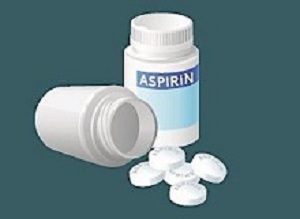Those who've never had a heart attack or stroke, should not be taking daily aspirin to prevent them, found a Canadian review of three large, randomised, placebo-controlled studies published in 2018, which showed the risk of major internal bleeding is higher than any preventative benefits.
"This is the most significant practice-changing evidence to come out in the past year," said Michael Kolber, a family medicine professor at the University of Alberta and co-author of the paper, along with recent University of Calgary family medicine graduate Paul Fritsch.
"These aren't nosebleeds or bleeding gums," Fritsch said. "These are major internal bleeds where the patients need hospitalisation and perhaps a blood transfusion, so they're of major clinical, and also personal, significance."
Fritsch said one of the studies also showed an increase in deaths from all causes, and in particular cancer deaths, among the patients who took aspirin (acetylsalicylic acid or ASA).
The advice to take a daily aspirin to prevent heart disease became dogma in the 1990s but it was based on flawed research, according to Kolber.
In an earlier study, Kolber found that 40% of Albertans over the age of 50 take aspirin to prevent cardiovascular disease, even though most have never had a cardiovascular event. He noted that aspirin is still considered beneficial for those who do have heart disease.
"We really see an aspirin gap," said Kolber. "There are a lot of people taking aspirin for primary prevention who don't need it, and there's a group of people who already have cardiovascular disease who aren't taking it, and they should be."
There were 3 high-quality, placebo-controlled RCTs of 100 mg per day of ASA.
- One followed 12 546 patients at moderate CV risk (10-year risk of 10% to 20% [mean 17%]). Patients were predominantly men (71%); mean age was 64 years.
- – After 5 years, there was no difference in composite CV events (4.3% vs 4.5% for placebo). The mortality rate was 2.6% in each arm.
- – Major gastrointestinal bleeds increased with ASA (0.3% vs 0.1% for placebo; number needed to harm [NNH] of 345).
- One followed 15 480 patients with diabetes (94% had type 2) and a mean age of 63 years; 63% were men.
- – After 7.4 years, ASA patients had decreased composite CV events (8.5% vs 9.6% for placebo; number needed to treat of 91) and increased fatal or major bleeding (4.1% vs 3.2% for placebo; NNH = 112).
- – There was no difference in all-cause mortality or cancer incidence.
- Another followed 19 114 elderly patients (median age 74 years) primarily from Australia. After 4.7 years (trial stopped for futility), ASA patients had no difference in composite CV events (3.5% vs 3.9% for placebo).
- – There were increases in fatal or major bleeds (3.8% vs 2.8% for placebo, NNH = 98), all-cause mortality (5.9% vs 5.2% for placebo; NNH = 143), and cancer deaths (3.1% vs 2.3% for placebo; NNH = 125).
Kolber advises those who have never had a heart problem to use other preventive measures. "Instead of just taking a daily aspirin like we've been taught for a generation, we would recommend patients stop smoking, exercise, track their blood pressure and consider the Mediterranean diet." Kolber said people with elevated future cardiovascular risk might consider taking a statin, which lowers cholesterol.
"The evidence for those measures is far superior to the evidence for aspirin," he said.
Primary CVD prevention should focus on proven lifestyle and pharmacologic therapies, rather than ASA. Smoking cessation is most effective, reducing CVD by more than 50%. Weekly exercise (150 minutes) can reduce CV mortality by up to 37% compared with no exercise. Mediterranean diets can reduce CV events by about 25%, while statins reduce CV events by 25% to 35%, depending on dose. Treating hypertension can reduce CV events by about 20% per 10 mm Hg reduction, depending on baseline blood pressure. Reductions are relative and benefits depend on baseline risk. Practitioners should use calculators to estimate CV risk and benefit of interventions.
Authors
Paul Fritsch and Michael R Kolber
[link url="https://www.folio.ca/canadians-told-to-stop-taking-aspirin-to-prevent-first-heart-attack-stroke/"]University of Alberta Faculty of Medicine & Dentistry material[/link]
[link url="https://www.cfp.ca/content/65/7/480"]Canadian Family Physician article[/link]

